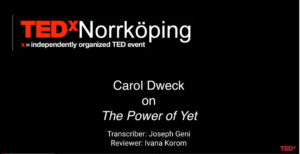What is Motivation
Motivation is a reason for action, a willingness to act, and a desire to set and accomplish goals. Motivation is derived from the word motive, or a need that requires satisfaction.
Developing motivation to allow sustained and deliberate practice is central to high levels of achievement in sport – and life.
Why are some players more motivated than others? The good news is that motivation is environmental related – so it is something that we can help our children develop by the way we interact with them, the questions we ask and more. We will be looking at two important sets of research when we talk about your player and their level of motivation: Dr. Carol Dweck’s research on Growth vs. Fixed Mindset and Deci & Ryan’s research on Self Determination Theory
You’ve likely heard of the two ways motivation is inspired: EXTRINSIC vs. INTRINSIC
Self Determination Theory
Self-Determination Theory (Deci & Ryan 2000) is a broad theory for the study of motivation. It is especially relevant when it comes to our children and the developmental environment we are creating as clubs, coaches and parents. Of course, this is relevant to all forms of development and motivation, not just on the soccer field.
Self Determination Theory evaluates the social and cultural factors at play that facilitate (or undermine) initiative, well being and performance (broadly described as MOTIVATION) based on three needs being met:
- Autonomy
- Competence
- Relatedness
Self Determination Theory proposes that the degree these three needs are met for an individual in an environment will affect the motivation of that individual. Or, another way of looking at it…if any of these needs (Autonomy, Competence, Relatedness) are not adequately met or supported, the impact will be detrimental when it comes to their level of enjoyment and motivation.
Autonomy, Competence, Relatedness Explained
Growth vs. Fixed Mindset with Dr. Carol Dweck
Dweck describes someone with a Fixed Mindset as someone who lacks confidence in their potential to improve and therefore often feels they need to prove themselves. After all, if you can’t improve, you better show everyone how talented, smart, athletic, etc. you are.
Because someone with a Fixed Mindset feels like they have something to prove to others, they are often consumed with what others think of them.
If I don’t start the game, then my teammate is better than me.
If the coach doesn’t use me as an example, then the coach does not like me.
I just missed that goal and the coach from the team I am trying out for is watching, so I doubt I will make the team.
Or maybe it’s the thought process of your child:
It won’t make a difference if I go and play in the backyard/juggle so I won’t go do that.
I am not going to tryout for that team because I probably won’t make it.
It can be tricky identifying a Fixed Mindset in kids because kids with a Fixed Mindset are not necessarily a pessimist. In fact, they are often upbeat and a great teammate most of the time. The issues for a Fixed Mindset child creep in when they are faced with a challenge or adversity of some sort.
The opposite, someone with a Growth Mindset, is someone who believes they are capable of improving. They are usually confident and secure and enjoy the process of improving – realizing that there will be some setbacks along the way. Someone with a Growth Mindset believes they can cultivate their athletic skills through effort. People with a Growth Mindset believe in the POWER OF POTENTIAL.
Growth Mindset kids are willing to put it all on the line, knowing that it may not be good enough at the moment. They are the kids that are continually improving and are intrinsically motivated.
5 Things Parents Can Say to Help Develop a Growth Mindset
- Honor the EFFORT, not the result.
Highlight their effort by saying things like “Wow, you sure are a muddy, sweaty mess. Clearly, you worked really hard. Great job.” “What was the hardest part of practice?” Don’t focus on the score of the game, the goal they scored, the number of juggles they got – it’s about the focus and effort – the process they went through to get the result. Be as specific as you can with your feedback.
- Praise their positive choices.
Did they choose to pass the ball against the wall instead of watching a TV show? Did they juggle for 20 minutes before dinner? “Great choice on how to spend your time before dinner.” Be sure to just talk about the choice, not a possible result. - Watch and listen to yourself carefully.
Concentrate on your body language while talking to your child or during a game and be sure you are focusing on effort, not results. A disappointed stomp and scream when they or a teammate misses a shot on goal, or a signal of frustration when a goal is scored against your child’s team are things your child files away in their memory bank – just as much as they remember a cheer of encouragement or an optimistic response. - Show your child you are interested in their development by asking them questions and just listening to their answers.
“What did you do in training tonight?” “What was the hardest part of the game?” “What did your coach say to the team?” “What did you learn today?” Not every conversation needs to be a teaching moment – listening and learning provides some incredible insights into the person they are becoming and helps them feel excited and cared for as a person, instead of always having to perform and win your approval as an athlete. - Find two specific and memorable times from a game where they worked hard or made a good decision – and tell them how much fun it was for you to watch them do that specifically.
“When you chased down their forward in the first half, that was amazing. I think you were running as fast as absolutely possible. It was all I could do to not cheer you on and embarrass you!” “Your decision to sit on the bench and pay attention to the game while you were not playing was really fantastic.”



